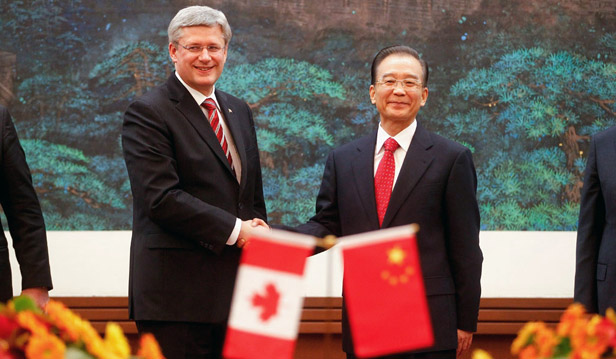
by Mark Taliano
Sometimes, the simplest solutions are the best ones. Unfortunately, though, Canada’s extreme concentration of corporate power often precludes the solutions from ever seeing the light of day.
The first step towards resolution of this problem is nomenclature. We need to free corporate-fashioned words from their false meanings.
Here are some examples:
Trade deals, including the so-called ‘free trade’ deals which have crippled North American manufacturing, are more accurately described as ‘corporate empowerment’ deals. Invariably, these deals empower transnational companies to relocate where wages are low (or in the case of prison labour, non-existent), where collective bargaining doesn’t exist, and where unions are impotent or non-existent.
Corporate empowerment deals, including the North American Free Trade Agreement (NAFTA) and the as yet unratified Foreign Investment Promotion and Protection Agreement (FIPPA), a bilateral agreement with China, empower corporations to the extent that government legislation becomes subordinated to corporate profits.
Corporate power deals are all shrouded in secrecy, but at least NAFTA arbitrations have pretensions of transparency (and Canada has yet to win a case), but the FIPPA arbitrations will likely not even be made public. If Canada determines that its sovereignty, economic, or environmental needs are more important than Chinese state-owned corporate profits, the case will be heard outside Canadian law, and in private.
Free trade is not free

The ‘freedom’ being exercised by these deals is clearly corporate freedom from the shackles of democratically legislated rules, regulations and laws. The false notion that they are ‘free’, or that ‘liberalized’ trade agreements are ‘liberal’ for anyone but the corporations, should be put to rest. Trade agreements negotiated over the last 30 years or so have been neither free, nor liberal, for the people of Canada.
‘Globalization’ is another corporate-engineered word that is intentionally deceiving. The globalization being described is not ‘democratic’ globalization, nor is it the globalization of improved human rights, or a globalized respect for the environment. In fact, it is the opposite. Corporate globalization, a more accurate description, has led to top-down corporate rule, diminished respect for human rights as defined by the United Nations, and reckless destruction of the world environment.
The word ‘capitalism’ is also wearing new clothes, thanks to corporate messaging of the ‘free marketeers’, and those who profess a love for ‘free enterprise’. Now the term more often refers to state-subsidized ‘monopoly capitalism’ (think Walmart, Monsanto, etc.). The new ‘capitalists’ are the speculators who drive up world prices of food and fuel, as they trade in commodities, derivatives, and hedge funds. In the world of these boom/bust/starvation-creating ‘capitalists’, the term is divorced from production, and it is too often divorced from the notion of the ‘public good’ as well.
Hyper-privatization
The term ‘privatization’, a hallmark of neoliberalism/neoconservatism, has also been crafted to mislead the public. Now the term more accurately describes anti-public ‘hyper-privatization’.
In many instances, hyper-privatization means that para-private interests are making in-roads into the public sphere to the detriment of the public. One such instance would be Public Private Partnerships (P3 arrangements). Evidence clearly shows that P3 hospitals cost more and are, therefore, an unnecessary burden on the public. This, however, has not stopped them from gaining a foothold in Canada.
Another example of hyper-privatization would be healthcare. Once the insurance lobbies persuade the public of the false-logic that privatized healthcare is the way to ‘move forward’, we will be stuck with a multi-tiered, inefficient, and costly healthcare system, (similar to the U.S. system) that will be an unnecessary disservice to the public.
The deconstruction of the corporate nomenclature gives us a clearer view of what is happening, but there are still huge impediments, or firewalls, to achieving a better economy and a better world.
Self-Interest lobby groups
Some of these firewalls include self-interested lobby groups that have disproportionate influence over public discourse and legislative polities. A list of these powerful organizations, as described by award-winning investigative reporter Nick Fillmore, in “It’s high time the Liberals or NDP challenged our ‘corporate elite’” includes:
• Canadian Council Of Chief Executives
• Canadian Bankers Association
• Canadian Association of Petroleum Producers
• Canadian Chamber of Commerce
Once past the nomenclature and the corporate-media supported ‘firewalls’, the list of better alternatives reveals itself.
The Bank of Canada advantage
One of many glaring examples, as described by George H. Crowell in his article,”An Urgently Needed Change in Monetary Policy: Borrowing from Bank of Canada would make governments debt-free” is brilliant in its simplicity.
Crowell argues that we should do what we did until about 1974 — instead of paying billions of dollars in interest on debts to private banks, the federal government should resume the practice of borrowing from the publicly-owned Bank of Canada, interest free. The benefits that would accrue, including the elimination of government debt, would empower the government to spend money on public institutions, improve the economy, and so on.
This change to monetary policy, endorsed by the Committee on Monetary and Economic Reform (COMER), is self-evident, but largely ignored by corporate media, since such a policy wouldn’t serve the immediate self-interests of their corporate owners.
Getting past the nomenclature and the lobby groups are the first steps to opening up the dialogue for a better Canada. Powerful special interest groups, such as the ones listed above, will not be our partners in the endeavour, but unearthing the seemingly simple solutions is a necessary step to rebuilding this country and the global community.
Mark Taliano is a writer, an activist and a retired teacher.
Watch Robert F. Kennedy Jr.’s recent speech on the increased influence of corporations on the Canadian and US governments:


Mark, could you email reference info regarding James Hall’s articles/books. You cited his work in your 2013 article on fundamentalism in Canada.
Have you published other articles on this topic?
The one misappropriated, misconceived word that really gets to me is “Globalism”, a conception of profiteers who can lead national governments on a wild goose, whack-a-mole, hide-and-seek game of trying to collect taxes on profits and, more and more often, failing. It is the outward counterpart of “Trade Deals” which allow profiteers to reach into nations and take, without hindrance by laws and regulations, what they like.
I had an interesting conversation with the late Johnny Rankin who explained to me, she then in her nineties, of her eventual conversion from socialist idealist to realist: formerly the ideal was to one day have a world where there would be no need for nations to compete against each other for the benefit of manipulative profiteers— yet eventually, and through the lens of municipal politics vis a vis her councillor husband, came to the realization that nations are necessary to protect social culture from fascistic movements that pop up from time to time in various parts of the globe.
Myself, I’ve come to adjust the confusing nomenclature of “neoconservative/neoliberal”, neither of which is suitable enough to stand on its own and behind which elements antithetical to public wealth and global health hide. The starkest distinction I see between these two “neo”s and the conservatism and/or liberalism perversely attached is about national patriotism, to which neither is attached. I decided to drop those inappropriate and misleading titles and adopt “neo-rightism” instead. Conservatives, for example, used to be the paragon of national patriotism; neo-rightists in contrast have no such loyalty— in fact they seek to avoid taxes and regulations legislated by national interests for the benefit and protection of respective citizens and environments. Harper’s Conservatives illustrate that by, as they have recently, shocking patriots who’ve been fooled into calling them “Tories” and hanging military veterans out to dry, inviting Chinese oil interests to trump our Constitution by way of a “Trade Deal” and importing cheap foreign labour that disemploys Canadian workers. Real Tories are starting to show through Harper’s Conservative disguise as they protest these moves on patriotic grounds.
The term “free enterprise” probably always was misconceived, at least ever since the self-proclaimed disciples of Adam Smith forgot to read the eighteenth century theorist’s conclusion of his seminal “Wealth of Nations” wherein he concludes the state must always have the ability to manipulate the “invisible hand of the market” whenever its social and economic interests are negatively affected by other states. It can hardly be any other way: as long as more than one state exists on this planet, as it has always been throughout human history, national strategy must trump markets and private interests. What profiteers really mean by “globalism” is nothing like a stateless world—in fact they actually need separate states in order to at turns hide unpaid taxes owed to some states behind “inviolable” national sovereignties of others and to pillage some states weakened by neo-rightist agendas without interference from other nations which may not be so enthralled. The prognosis for this so-called “globalism” remains world war, ecological catastrophe or both, one ‘invisible hand’ shaking the other.
As I see it,one of the major reasons corporatism has been able to take over the world is part of the conspiracy and a byproduct of it.And that is the suppression of the general working and taxpaying population by keeping them totally busied out trying to survive the longer working hours,the lower wages and the constant rise in the cost of living.Most working family people are so busy just getting to the next paycheck to pay all their living expenses they have no time or energy to care about what’s really going on around them.In this scenario created corporately it is very hard to interest most people in causes,in the environmental rape and pillage of our country and the world for corporate profit.Fish farms,pipelines,LNG,fracking,unnecessary power projects etc are laying waste to our world as we stick our head up our ass, pay our bills and try to survive for another day.Maybe one day we’ll wake up,maybe not and will it be too late?It already is in many cases.But right now enough of us have our food, houses,cars,vacations,etc to keep things turning.But with the eternal and mindless corporate race to the bottom there will be a tipping point with no chance for escape.
“Slavery is the Legal Fiction that a Person is Property.”
“Corporate Personhood is the Legal Fiction that Property is a Person.”
Excellent article.
I think the only way to counter the build up of corporate power is with a political movement, which could be called “The Movement.” It’s where unions, NGOs and activists come together to focus on a few human issues, making the many voices one. (But they keep fighting for their own individual causes.)
The organization would be controlled by direct democracy. Spokespersons would be elected, not leaders. There would be votes on which issues of the day to focus on.
This organization would be at a municipal, state, federal and international level.
It wouldn’t replace representational government. It would simply lobby and influence it like corporations do. That way there would be balance in government.